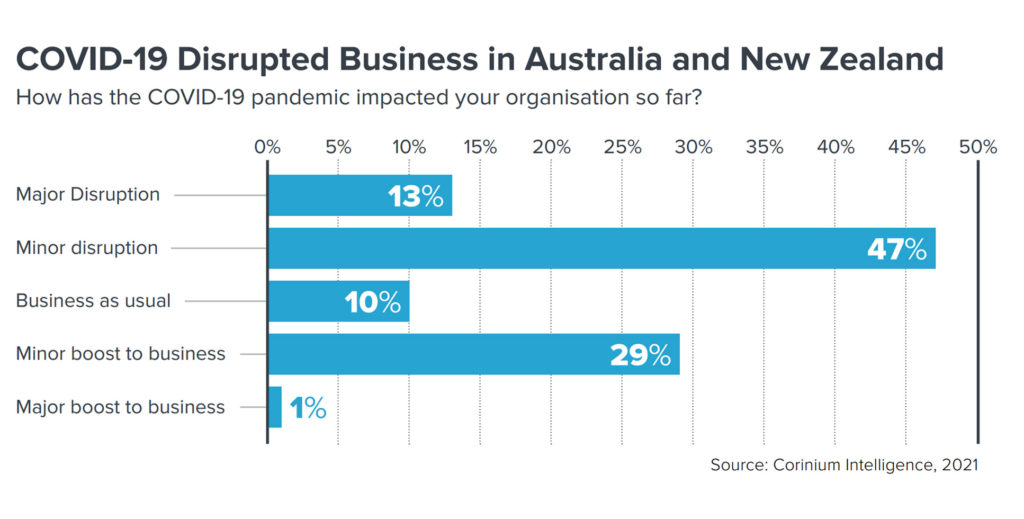Demand for Data Expertise Rising in A/NZ

COVID-19 disrupted business and budgets across many organizations in Australia and New Zealand, but demand for data and analytics expertise has grown
The onset of the COVID-19 pandemic saw people around the world pay attention to data like never before. Statistics on case numbers, hospitalisations and recoveries were tracked daily and reported by news outlets, and governments espoused the importance of ‘flattening the curve’, referencing the rate of new infections as expressed on a line graph.
As we kept a close eye on the numbers, Australia and New Zealand performed relatively well in hampering the rapid spread of the virus, and many enterprise businesses appear to have weathered the storm, adapting to remote working quickly and establishing digital initiatives to support house-bound staff and customers during times of lockdown.
We recently surveyed 150 data and analytics leaders across Australia and New Zealand to gauge the maturity of their departments, as well as data and analytics in the region as a whole. We also asked about the impact of COVID-19 on their organizations and data practices.
Our findings show that COVID-19 has increased the demand for data and analytics expertise and, while there is positive adoption and good use of data being demonstrated, there is still work to do to make data and analytics a driving force in business strategy for many Australian and New Zealand organizations.
“COVID-19 has pushed data into a really important place for organizations, where its value previously may not have been as recognised,” says Catherine Lopes PhD, Head of Data Strategy and Analytics for ME Bank.
“People have realised they need to have accurate data close at hand to make decisions. When you are thinking tactically day to day, week to week, the importance of getting data right, making it accessible and available becomes more obvious.
“Organizations have realised they really need to have basic business intelligence (BI) at a foundational level. Many want to do advanced analytics, but they have realised that first they need a dashboard; they need BI and the metrics to help them make business decisions. In turn, they may not have progressed on advanced analytics or AI, because that’s the future and they need to get today right.”
COVID-19 Impact Presents Disruptions
While the pandemic may not have struck Australia and New Zealand in the same way it did countries overseas, data and analytics leaders here still say this has been a disruptive time for their organizations.
Of our survey respondents, 60% say the pandemic had been disruptive to their organizations, but 47% categorise that disruption as ‘minor’. Comparatively, before July 1, 2020, 76% of respondents in our State of Data and Analytics Europe 2020 report said the pandemic was disrupting their business, with 46% describing that business disruption as ‘major’.
In Australia and New Zealand, 29% of our respondents even report experiencing a minor boost to business due to the pandemic, while 10% say things have been ‘business as usual’.

While data and analytics leaders in Australia and New Zealand have not been overly negative about the extent that COVID-19 disrupted operations, there is a definite lack of optimism when it comes to how they expect their budgets to fare in the next 12 months.
Of our respondents, just over 51% expect their departments’ budgets will decrease in the next year, with almost 31% of those surveyed anticipating up to a 10% cut. Meanwhile, almost 21% predict a budget dip between 11-20%, while 12% expect no change in their budgets at all.
Interestingly, 32% of respondents expect their budgets to grow by up to 10%, while 5% expect between 11-20% budget growth.
“There was a lot of fear around COVID-19 early on, with regards to revenues suffering and businesses perhaps not surviving,” says Virginia Wheway, VP of Data and Analytics at Australian mattress and furniture retailer Koala.
Wheway adds that businesses either choosing or being forced to become more digital are now seeing the benefits.
“With that shift to digital will come big opportunities for data professionals in lots of different industries and interesting roles,” she says. “I think it’s a candidate’s market at the moment.”
Data and Analytics Expertise is in Demand
Data and analytics leaders in Australia and New Zealand may not be expecting a big boost to their budgets in the next 12 months, but they are sending a strong message about the growth in demand for data and analytics expertise since the arrival of the pandemic.
When asked how the demand for data expertise has changed in response to COVID-19, 60% of our respondents say there has been an increase in demand. Meanwhile, 13% report the demand increase as being major. Only 25% report a decrease in demand, while 15% say they have seen no change.

With the rapid shift to digital across many industries, it is unsurprising that data and analytics leaders are seeing an increase in the demand for their services. This, in turn, has made them more confident than not that their teams will grow in the next year.
Asked how they expect their departments’ staff numbers to change over the next 12 months, 57% of respondents say they expect department staff to increase, with 32% of respondents expecting a headcount rise of between 26-50%.
The 36% of respondents who expect staff numbers to drop expect a less significant change than those who predict staff increases, with 13% of respondents expecting a 26-50% reduction of existing staff.
While organizations in Australia and New Zealand have faced disruption and some stagnated spending, it is clear that many see a need for more data and analytics expertise to survive in the digital, data-driven ‘new normal’.
“Now that there is huge acceleration in the digital space, if anything, there is more pressure on analytics teams to deliver insights and reporting on a timely basis to keep up with queries that are coming in,” says Gladwin Mendez, Data and Technology Operations Officer at New Zealand-based financial services firm Fisher Funds.
“The CDO and other executives are wondering things like, ‘How many customers did we get yesterday? How many do we have now? How many are we converting?’
“With those kinds of requests, previously people thought it was nice to know the numbers. But when your survival depends on how many conversions you are making, or why you aren’t converting, that process view is all driven on data, and reporting insights on top of that.”
This is an excerpt from our State of Data and Analytics Australia and New Zealand 2021 research report. Click here now to read the full report and learn more about the data and analytics maturity in this region as well as priorities for data and analytics leaders.



